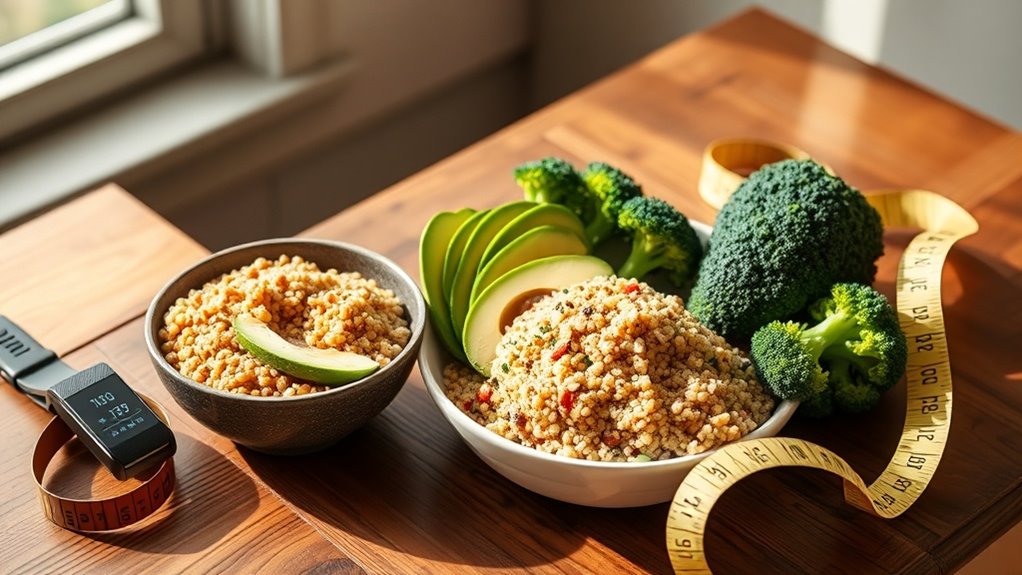The Truth About Cheat Days – What Really Happens
Cheat days can feel like a golden ticket to indulgence, but the reality is more complex. While these days provide a mental break and can temporarily boost your metabolism, they also come with potential pitfalls. You might be surprised to learn how they can lead to fat storage and even insulin resistance if mismanaged. Understanding the truth behind cheat days is crucial for your long-term success and well-being. What should you really consider before indulging?
Key Takeaways
- Cheat days can provide psychological relief, boosting motivation and adherence to long-term dieting efforts.
- Indulging in high-calorie foods may lead to increased fat storage and potential insulin resistance if not managed properly.
- A single cheat meal won’t ruin diet progress if it is balanced and integrated mindfully into overall caloric intake.
- Cheat days can create a guilt-reward cycle, so moderation and mindful eating are essential to prevent unhealthy habits.
- Frequent cheat days may disrupt weight loss efforts by slowing metabolism and increasing cravings for unhealthy foods.
Understanding Cheat Days: The Basics
Cheat days can play a significant role in various dieting strategies, especially for those looking to maintain long-term adherence to a healthy eating plan.
Incorporating cheat meals can provide psychological relief, making your diet feel less restrictive.
This approach can boost your motivation and help you stick to your fat loss goals over time.
However, it’s crucial to balance these indulgences; excessive cheat meals can hinder your progress.
Understanding how cheat days fit into your overall caloric intake can ensure they enhance rather than sabotage your fat loss efforts.
Moderation and mindful choices are essential for effective dieting success. Additionally, timing your cheat meals after intense workouts can aid recovery and help manage fat gain.
The Science Behind Caloric Surplus
How does a caloric surplus impact your body?
When you consume more calories than you burn, your body enters a state of caloric surplus.
This can lead to several physiological effects, including:
- Increased fat storage, as excess energy is converted to fat
- Muscle gain, provided you’re also engaging in strength training
- Elevated metabolic rate, as your body works to process the extra calories
- Potential insulin resistance, affecting how your body manages sugar
While a caloric surplus can support muscle growth, it’s essential to monitor your intake to avoid unwanted fat gain and other health issues. Additionally, consuming sugar-laden foods can exacerbate fat gain while you’re in a caloric surplus.
Psychological Effects of Cheat Days
Cheat days can trigger complex emotions like guilt and shame, impacting your overall mindset toward dieting.
While some view cheat days as a reward for hard work, others may see them as a form of punishment that complicates their relationship with food.
Understanding these psychological effects can help you navigate your eating habits more effectively. A positive mindset is essential for sustainable weight management and can help mitigate the negative emotions associated with cheat days.
Guilt and Shame
Why do so many people feel guilty or ashamed after indulging in a cheat day?
This emotional response often stems from societal pressures and personal expectations.
You might experience feelings of guilt due to:
- Internalized beliefs about food and body image.
- Fear of losing progress in your health journey.
- Comparison with others who seem more disciplined.
- A sense of failure for not adhering to a strict diet.
These feelings can overshadow the enjoyment of your cheat day, turning a moment of celebration into one of regret.
Recognizing these emotions is the first step toward a healthier mindset around food and self-acceptance.
Reward vs. Punishment
Is indulging in a cheat day a reward or a form of self-punishment?
For some, it feels like a well-deserved treat, a way to break the monotony of strict dieting.
This can boost motivation and enhance adherence to a long-term eating plan.
However, if you view cheat days as a way to compensate for perceived failures or guilt, they may act more as punishment than reward.
Research shows this mindset can lead to unhealthy cycles of restriction and bingeing.
Understanding your motivation behind cheat days is crucial in determining their psychological impact on your overall well-being.
Motivation and Mindset
Understanding the motivation behind your eating choices can profoundly shape your relationship with food, particularly when it comes to cheat days.
These days can serve as mental breaks, but they can also trigger negative patterns.
Consider the following:
- They can boost your morale, making you more committed during the week.
- They may create a sense of deprivation, leading to binge eating.
- They can reinforce unhealthy associations with specific foods.
- They might distract you from overall progress you’ve made.
Recognizing these psychological effects helps you maintain a balanced approach, allowing cheat days to enhance rather than hinder your health journey.
The Impact on Metabolism
When you have a cheat day, it can temporarily boost your metabolic rate due to hormonal responses like increased leptin levels. This spike might help counteract the metabolic slowdown often seen with prolonged dieting. However, the effects can vary based on individual factors, so it’s essential to consider how your body specifically responds. Additionally, understanding the metabolic slowdown effect is crucial for effectively managing your weight loss journey.
Metabolic Rate Changes
How do cheat days affect your metabolic rate?
Cheat days might seem like a break, but they can actually influence your metabolism in various ways.
Here’s what you need to know:
- They can temporarily boost your calorie intake.
- Increased calorie consumption may elevate your energy expenditure.
- Cheat days might help prevent metabolic slowdown during dieting.
- Your body may adapt, potentially leading to fewer benefits over time.
While a well-timed cheat day can create a brief metabolic spike.
It’s essential to maintain a balanced approach to your overall diet for sustainable results.
Hormonal Responses Explained
Cheat days can trigger significant hormonal responses that affect your metabolism.
When you indulge, your body releases insulin, which helps manage blood sugar levels. This spike can temporarily boost your metabolic rate, helping you burn calories more efficiently.
Additionally, cheat days may increase levels of leptin, a hormone that regulates energy balance and appetite, promoting feelings of fullness.
However, frequent cheat days can lead to insulin resistance over time, potentially slowing your metabolism.
It’s essential to balance indulgence with a healthy diet to optimize these hormonal responses and maintain long-term metabolic health. Moderation is key to reaping the benefits.
Common Myths About Cheat Meals
Many people hold onto myths that can mislead their understanding.
Here are some common ones:
- Cheat meals ruin progress: A single meal won’t derail your entire diet if managed correctly.
- You can eat whatever you want: Moderation is key; bingeing can lead to unhealthy habits.
- Cheat meals boost metabolism: While they can offer a psychological break, they don’t significantly speed up metabolism.
- They’re necessary for long-term success: Not everyone needs cheat meals; it depends on your personal goals and relationship with food.
Understanding these myths can help you approach cheat meals more effectively. Additionally, focusing on balanced nutrition can ensure that cheat meals fit into your overall dietary plan without compromising your health goals.
Strategies for Effective Cheat Days
When planning a cheat day, it’s crucial to set clear intentions to ensure it supports your overall goals rather than hinders them.
Start by choosing a specific day and preparing your favorite meals in advance, so you’re less likely to overindulge impulsively.
Aim to balance your cheat meals with healthier options throughout the day, maintaining some nutritional value.
Keep portion sizes in check; remember, moderation is key.
Additionally, stay active on your cheat day to help offset calorie intake.
Finally, reflect on how your cheat day impacts your mood and cravings to make future adjustments that align with your long-term objectives. To enhance your experience, consider incorporating mindful eating practices to truly savor your favorite treats without guilt.





